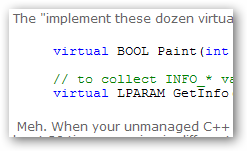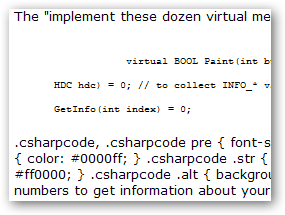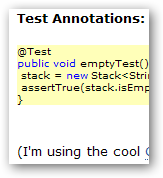Saturday Jenn and I spent the majority of the day at pyrotechnics
training, an annual class put on by Western Display
Fireworks. Western is the company we
work for on the Fourth of July when we head up to Clatskanie and do the
fireworks
show. You
have to attend a training class within the three years prior to your
license
expiring, and since our license expire next year, we figured this would
be a good opportunity. Always good to refresh yourself on the laws and
safety regulations.
 Saturday
night on the way back from pyro class we stopped by my parents’ place to
visit. Mom picked me up a Lego Imperial Star
Destroyer
for a song at a sale she found so I got that from her. She also found
this cool CSI Facial Reconstruction
Kit, so
she passed that along. Fun!
Saturday
night on the way back from pyro class we stopped by my parents’ place to
visit. Mom picked me up a Lego Imperial Star
Destroyer
for a song at a sale she found so I got that from her. She also found
this cool CSI Facial Reconstruction
Kit, so
she passed that along. Fun!
Sunday was chore day. We got up reasonably early and I went around the
house to all the windows and re-caulked everywhere that the caulking had
split due to the house settling. That meant all four corners to most of
the windows and many spots along the top of each window, necessitating
the removal of the blinds. It was a heck of a job and took close to four
hours to hit every window in the place, but I got it done and it’s
looking good again. Took a tube and a half of caulk, which is a personal
record for maximum caulk use at a given time. Heh.
I had planned on watching The Empire Strikes
Back and
putting together the Lego Imperial Star Destroyer in the afternoon, but
since I had run out of caulk (I only bought one tube), we had to run out
to the store and while we were out we ended up getting Dance Dance
Revolution Universe for Xbox
360 with a
Target gift card we had left over from Christmas…
…which, of course, led to my evening consisting of the finishing up
of tasks and an hour and a half of DDR, effectively routing my ability
to also watch the movie and play Legos. I will have to commence
Star-Wars-ing this evening when I get home.
DDR on Xbox 360 is a welcome addition to our home, though. Jenn and I
were just talking about how we don’t go to the gym because we’re lazy
and it’s boring, and we realized that the one time we did end up losing
weight, we were doing an awful lot of DDR. The problem up until now was
that, frankly, I’m a Gamerpoint Whore so not getting achievements while
I game became patently unacceptable, regardless of the fact we have like
three different DDRs for PS2. Now I can have my cake and eat it, too -
DDR on Xbox 360 gives me my DDR fix as well as the ability to get
Gamerpoints.
In a similar vein, the purchase of DDR was my impetus to pull the
receiver out and rewire things so the Xbox 360 now goes through it,
finally giving me digital surround in games and media. (Yes, I now
realize what I was missing by not having this hooked up and it makes me
want to go back and play all the games I’ve already played because it’s
that much better.) It was going to have to happen anyway if I ever get
off my butt and make the media server I want to, but having to get back
there and futz around with the wiring just wasn’t on the top of my list
of fun things to do. As it is, my receiver is at its limit with inputs,
so the Xbox 360 is now plugged into the CD player optical-in jack and
the CD player has been moved to the last remaining input - the “video
auxiliary,” which is on the front of the receiver and only offers a
standard RCA stereo-in connection. It means I don’t get the digital
clarity when I listen to CDs anymore, but that’s not to big of a deal
since I don’t listen to CDs very much. Plus, if it’s killing me that
much, I can always listen to them through the DVD player rather than the
CD player and I’ll get that digital quality back. What does bug me is
that it looks hokey - the wires run from the back of the CD player, down
the back of the cabinet, and along the shelf next to the receiver to
plug into the front of the thing. Not much I can do about that, but it
doesn’t overwhelm me with elegance. It does make me think about what I’m
going to want in my next receiver, though, and the number one
determining factor is going to be quantity of inputs.
At some point over the course of the weekend I put a nice gouge in the
right lens of my glasses. Not really sure how it happened or when, but
when I was cleaning them last night, there it was. It’s not in my direct
line of sight so it’s not bugging me too bad, but if I look through the
bottom half of the lens, there’s a bit of blur because of it. It’s
probably time to get new lenses anyway.



